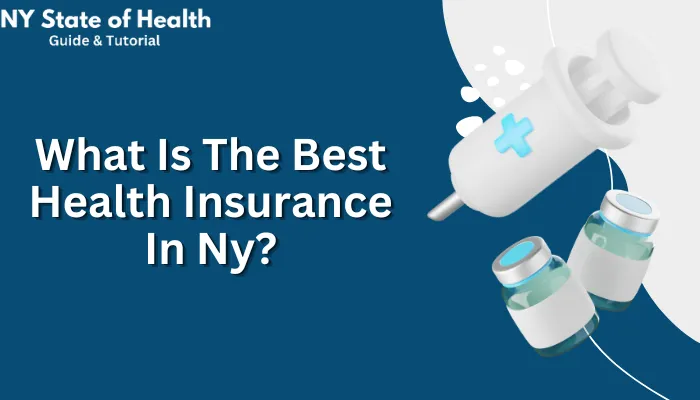Do not panic! This guide will help you answer this question, What Is The Best Health Insurance In NY? Having read this article, you will have known enough to select a package that suits your budget and personal needs.
A good health insurance plan is a fundamental aspect of life, particularly in a place like New York. Nonetheless, navigating through the insurance market in search of the best coverage can be quite overwhelming given that there are numerous plans and providers available.

An Overview of Health Insurance in the Empire State
New York has an evolving health insurance industry that offers several plans to cater for different needs. One key player in this system is the NY State Website for Health (NY State of Health).
The easy-to-use website permits you to contrast plans, sign up for coverage and even meet the criteria for financial aid programs. Let us explore some kinds of packages that can be found when you are searching for the best health insurance in NY.
Types of Health Insurance Plans
What Is The Best Health Insurance In NY? The health insurance plans offered by the NY State of Health marketplace vary widely with their upsides and downsides. Some common types are as follows:
- Health Maintenance Organizations (HMOs): These focus on preventive care and require you to choose one primary care physician (PCP) within the network who will refer you to specialists if necessary. They usually offer lower premiums but may limit out-of-network coverage.
- Preferred Provider Organizations (PPOs): This type allows greater flexibility for choosing doctors and hospitals where treatment should be sought. It’s possible to use only network-approved physicians or go out-of-network providers without referral things being required. PPOs often have higher premiums than HMOs do.
- Exclusive Provider Organizations (EPOs): Just like HMOs they won’t pay for services given by out-of-plan providers unless it’s an emergency. They usually have lower premiums than PPOs but more limited networks.
- Point-of-Service (POS) Plans: Point-of-service plans are a combination of HMO and PPO models. You’ll typically have a PCP assigned to you, but can visit outside network providers at higher prices if you so wish.
- High-Deductible Health Plans (HDHPs) with Health Savings Accounts (HSAs): By having HDHPs, the premium cost becomes cheaper while the deductibles—the initial amount you pay from your pocket before insurance begins—rise.
For those who are healthy and do not anticipate high medical costs, these accounts allow qualified medical expenses to be purchased using pre-tax dollars hence possibly providing some tax benefits.
Understanding Key Terms:
- Premiums: These are payments made monthly to your insurance company in exchange for coverage.
- Deductibles: The insured party must cover such declared amounts from their pockets before compensation comes into effect.
- Copayments: A flat rate that one would expect to pay for specific types of covered services e.g., doctor visits or drug prescriptions.
- Coinsurance: Your insurer splits the bill based on a percentage after you’ve met your deductible.
- Out-of-pocket Maximum: This refers to the highest amount that can be spent within a year on covered services after both deductibles and coinsurance costs have been paid off.
Factors to Consider When Choosing a Plan
However, with the numerous alternatives available it always boils down to personal preferences and what suits one’s individual needs as far as health insurance is concerned when looking for the What Is The Best Health Insurance In NY?
- Individual vs. Family Coverage: Do you need coverage just for yourself, or are you including your spouse and/or children? Family plans usually come with higher premiums.
- Monthly Premiums vs. Out-of-Pocket Costs: Consider your budget. Lower premiums might be tempting, but they could be partnered with high deductibles and out-of-pocket costs.
- Network Coverage and Provider Choice: Do you have a favourite doctor or specialist? Verify that the one you choose is in-network with the plan that you purchased. HMOs generally have smaller networks while PPOs offer more choices.
- Prescription Drug Coverage: If you depend on regular prescription medications, ensure the plan has your prescriptions at an affordable cost.
- Additional Benefits and Perks: Some policies provide extras such as vision or dental coverage, gym memberships or wellness programs so take note of them when comparing plans.
- Financial Assistance Options: Were you to qualify NY State of Health has subsidies to help reduce your monthly premium payments.
Table 1: Key Considerations When Choosing Health Insurance in NY
| Factor | Description |
|---|---|
| Coverage Type | HMO, PPO, EPO, POS, HDHP with HSA |
| Individual vs. Family Coverage | Consider the number of people you need to cover (e.g., yourself, spouse, children). Family plans usually have higher premiums. |
| Premiums vs. Out-of-Pocket Costs | Balance affordability against potential healthcare needs. While less expensive premiums may seem appealing, this may be coupled with higher deductibles and out-of-pocket costs. |
| Network Coverage | Ensure that your preferred doctors and hospitals are part of the network covered by the plan selected by you; the difference between HMOs having narrower networks and PPOs offering more choice. |
| Prescription Drug Coverage | Check out subsidy options offered through the NY State of Health if you qualify. This could help reduce your monthly premiums by much. |
| Additional Benefits and Perks | Think about extra benefits like vision or dental coverage, gym memberships, or wellness programs. These perks can add value to your plan but also have an impact on cost. |
| Financial Assistance | Check out subsidy options offered through NY State of Health if you qualify. This could help reduce your monthly premiums by much. |
Tips to Find the Best Health Insurance for You
With information about different types of plans, key factors to consider and services offered by major providers, here are some practical tips to choose the best health insurance in NY for your needs:
- Assess Your Healthcare Needs and Budget: Consider healthcare needs ahead of time, weigh potential healthcare costs against premiums, and set a budget you can live comfortably with.
- Compare Plans Using NY State of Health Marketplace: The website allows you to compare plans side by side based on your zip code, what coverage is desired for different issues and estimated costs. This is a helpful resource to find plans that meet your objectives.
- Consider Consulting with a Licensed Insurance Broker: For complicated cases or when more detailed explanations from each company are needed consider seeking advice from a licensed broker. Such brokers will guide more complex medical conditions as well as how all these policies work.
- Take Advantage of Preventive Care Services: Many plans cover preventive screenings as well as checkups. Through regular use of these services, it is possible to maintain good health and avoid costly treatments in future.
Renew Your Plan Annually During Open Enrollment: Your healthcare needs and budget may change over time. Never forget to take part in the open enrollment process each year to weigh your options and change a plan if necessary.
Real-Life Scenarios
Let us look at some practical examples to see how these factors can come together when choosing health insurance:
- Example 1: A Young Professional with Minimal Healthcare Needs: For Sarah, a young, healthy professional, having a low monthly premium is crucial. In this case, she might think of enrolling in an HMO plan that has a narrow network but low costs as she hardly goes for medical checkups.
- Example 2: A Family with Children Requiring Specialized Care: The Jones family has two young children one of whom has a chronic health condition requiring regular visits to the specialist. They could consider subscribing to the PPO plan that comes with more expensive premiums albeit wider networks so that there can be easy access to all their doctors of necessity.
- Example 3: A Retiree with Chronic Health Conditions: John is a retired person who is on a fixed income and he also has several chronic diseases. This means that it would be wiser for him to get into plans with lesser deductibles than higher premiums or even good prescription drug coverage; exploring options through the NY State of Health could help as well.
Conclusion
Identifying “What Is The Best Health Insurance In NY?” is not an easy pick-and-go thing. Understanding different plans available, key considerations as well as what leading providers have on offer will enable you to make informed choices that address your specific healthcare needs while fitting within your budget.
Keep in mind; that you can compare plans and find out whether any financial help is there for you by visiting the NY State of Health site. You may also speak to an authorized insurance broker who will guide you throughout this journey.
By making an informed decision, that is how you will survive the baffling and complex world of health insurance with a clear mind and good consciousness ultimately taking control of your health and life as a whole.
